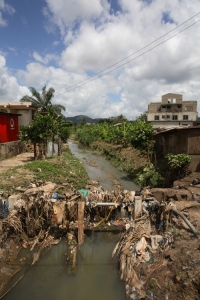Awareness Into Action: Broken Windows
This series of posts documents two ordinary folks attempting to get out there and do good. Over the next few months, we’ll follow them through the setbacks and triumphs of their endeavor to take the inspiration of Mountainfilm and turn it into something tangible. (To catch up. start here.)
As an individual, looking at problems on a macro scale can be daunting and more than a little discouraging. How does one person even begin to make a dent in monster problems like AIDS or poverty? The trick seems to be to compartmentalize and tackle facets of these large problems, with heavy emphasis given to sustaining positive changes. Distributing condoms in a country wracked by AIDS is a noble effort, but will it make a difference if no one uses them after you’re gone? The task you’re left with, then, is to influence people’s behavior, beyond simply providing them with the means to improve their situation. An interesting theory on creating sustainable change is called the broken window theory. It was originally introduced in 1982 in an Atlantic article by James Q. Wilson and George L. Kelling and was popularized by Malcolm Gladwell’s pop-science bestseller The Tipping Point. The theory posits that a society that maintains the appearance of lawlessness will further breed lawlessness or harmful behavior. The eponymous case in point suggests that a broken window that remains unrepaired will encourage vandals to break more windows. In the continued absence of repair, the vandals may then proceed to break into the building and vandalize surrounding buildings. Eventually, the district itself becomes a lawless zone. Thus, speedy remedy of lawlessness indicators (broken windows, graffiti, abandoned cars, dilapidated buildings, etc.) will deter petty crime and, by extension, will prevent major crime. Programs on this theory have been effective in several metropolitan areas, from New York City to locations in the Netherlands. Now, Jenny and I aren’t trying to reduce crime in Ghana, but we think the theory has some relevant applications to work that can be done here. There are myriad problems here, but let’s tackle one: litter.
Sadly, littering is the norm here. Unlike western nations, there is no stigma associated with throwing your trash out the window. Every street, backyard, and alley is littered with thousands of pieces of plastic debris. Special teams have to be sent periodically to clear rivers of accumulated plastic bottles and satchets to prevent disruption of the watershed and flooding. So, how to change this behavior? At first blush, a media campaign discouraging littering might seem just the ticket. In fact, this has been attempted, and the sole legacy of the project is a scattering of rusty signs in population centers. What if we apply the broken window theory and create an environment in which people didn’t feel that it’s acceptable to drop trash on the ground? Would I feel less inclined to throw trash on the ground if I were on a spotless street? Of course I would. It’s a matter of social norms: as humans, we constantly monitor our surroundings to determine the appropriate behavior. If I were in a nation of people that spurned clothes, I would happily strut around nude. However, if I were not, I might hesitate to inflict my unmentionables upon the general populace. Now, to create an environment that discourages littering. First, people need to get out there and get elbows deep in some trash. Clean the streets EVERY DAY and build big honking trash cans on every corner. Will this work better than a nationwide media blitz? We think so, and it’s probably cheaper. It’s also a self-sustaining effort. No littering = clean streets = no littering. That’s math. We’re not so naïve as to think that eliminating litter will solve all of Ghana’s problems. But we do think that cleaning up the country could have expansive implications on all sorts of issues Ghana faces. Civil engagement is the greater goal that fixing this broken window aims for. It’s clear the government has been only marginally effective at addressing Ghana’s problems, and that real change will occur on a grassroots level. If people begin by taking pride in keeping their surroundings clean, perhaps they will take pride in reducing corruption in the government and in law enforcement, cleaning up the environment, reducing activities that lead to HIV / AIDS, increasing the rate and quality of education, etc. Hey, looks like we saved the world, after all. This was a heavy topic. For a little lighter fare, read next week's post on everyone's favorite thing: gear!
